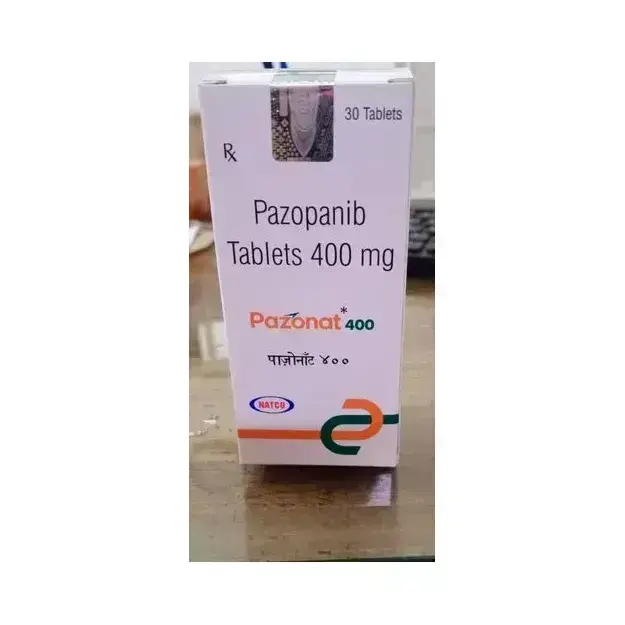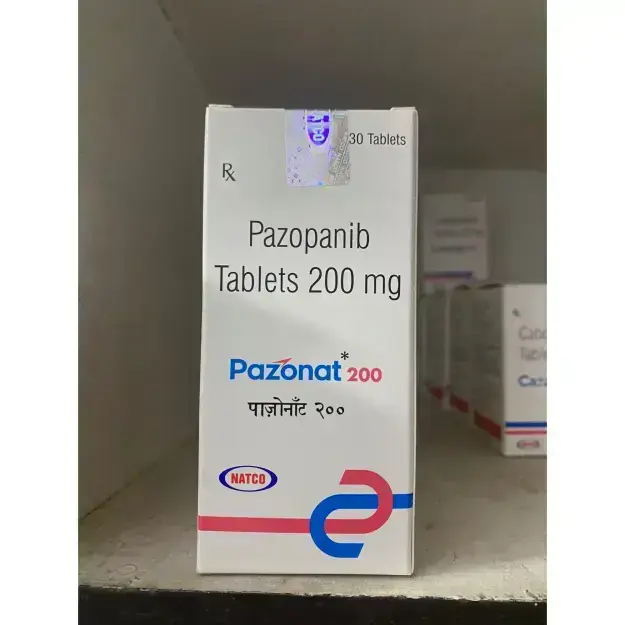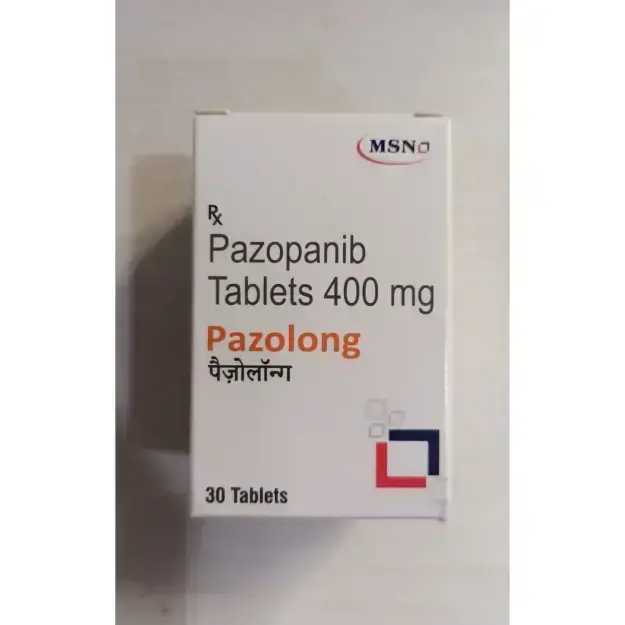Pazoci, contains Pazopanib, is an oral medication primarily used in the treatment of advanced renal cell carcinoma and soft tissue sarcomas. As a multi-targeted receptor tyrosine kinase inhibitor, it impedes tumor growth and angiogenesis by targeting specific enzymes.
Medical Uses
-
Advanced Renal Cell Carcinoma (RCC): It is utilized in patients with advanced stages of RCC to slow disease progression.
-
Advanced Soft Tissue Sarcomas: Indicated for patients who have received prior chemotherapy, Pazopanib offers therapeutic benefits in managing these malignancies.
Additionally, Pazopanib has shown potential in treating aggressive fibromatosis (desmoid tumors) and has been explored in ovarian and non-small cell lung cancers. However, its application in ovarian cancer has not received regulatory approval.
Mechanism of Action
Pazopanib functions by inhibiting multiple tyrosine kinases, including:
-
Vascular Endothelial Growth Factor Receptors (VEGFR) 1, 2, and 3: These receptors play a crucial role in angiogenesis, the formation of new blood vessels that supply tumors.
-
Platelet-Derived Growth Factor Receptors (PDGFR) α and β: Involved in cell growth and survival.
-
c-KIT: A receptor implicated in cell proliferation.
By targeting these receptors, Pazopanib disrupts pathways essential for tumor growth and vascularization.
Administration and Dosage
Pazopanib is administered orally in tablet form, taken on an empty stomach—either at least one hour before or two hours after a meal—to enhance absorption. Tablets should be swallowed whole without splitting, chewing, or crushing. Dosage adjustments may be necessary based on individual patient response and tolerability.
Pharmacokinetics
-
Absorption: Pazopanib has an oral bioavailability of approximately 21%, with peak plasma concentrations reached around 3.5 hours post-administration.
-
Distribution: Over 99.5% of Pazopanib binds to plasma proteins.
-
Metabolism: Primarily metabolized in the liver by the CYP3A4 enzyme, with minor contributions from CYP1A2 and CYP2C8.
-
Elimination: The drug has a mean half-life of about 30.9 hours and is excreted mainly via feces, with less than 4% eliminated through urine.
Contraindications and Precautions
Pazopanib is contraindicated in individuals with known hypersensitivity to the drug or its components. Caution is advised in patients with:
-
Hepatic Impairment: Severe liver toxicity, including fatalities, has been reported. Regular liver function monitoring is essential.
-
Hypertension: Elevations in blood pressure, including hypertensive crises, have occurred. Blood pressure should be well-controlled prior to initiating treatment and monitored regularly.
-
QT Interval Prolongation: Pazopanib can prolong the QT interval, increasing the risk of torsades de pointes. Electrocardiograms and electrolyte monitoring are recommended.
-
Thrombotic Events: Arterial and venous thrombotic events, including myocardial infarction and cerebrovascular accidents, have been observed.
-
Hemorrhagic Events: Severe bleeding, including fatal cases, has been reported.
-
Gastrointestinal Perforations and Fistulas: Cases of gastrointestinal perforation and fistula formation have been noted.
Due to the risk of hepatotoxicity, liver function tests should be conducted before starting treatment and monitored periodically thereafter.
Adverse Effects
Common side effects include:
-
Diarrhea
-
Hypertension
-
Hair color changes
-
Nausea
-
Anorexia
-
Fatigue
-
Elevated liver enzymes
Serious adverse effects encompass hepatotoxicity, QT prolongation, hemorrhagic events, and thrombotic events. Patients should be closely monitored, and any severe or persistent adverse reactions should prompt reevaluation of therapy.
Drug Interactions
Pazopanib's metabolism via CYP3A4 makes it susceptible to interactions:
-
CYP3A4 Inhibitors (e.g., ketoconazole, ritonavir): May increase Pazopanib levels, elevating the risk of toxicity.
-
CYP3A4 Inducers (e.g., rifampin): Can decrease Pazopanib levels, potentially reducing efficacy.
Concomitant use of acid-reducing agents (e.g., proton pump inhibitors, H2 antagonists) may affect Pazopanib absorption. St. John's wort may decrease Pazopanib levels and should be avoided.
X













